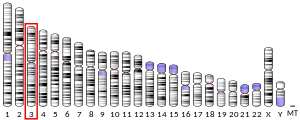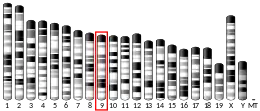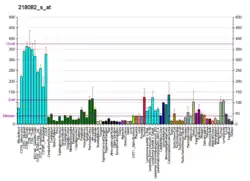UBP1
Upstream-binding protein 1 is a protein that in humans is encoded by the UBP1 gene.[5][6]
| UBP1 | |||||||||||||||||||||||||||||||||||||||||||||||||||
|---|---|---|---|---|---|---|---|---|---|---|---|---|---|---|---|---|---|---|---|---|---|---|---|---|---|---|---|---|---|---|---|---|---|---|---|---|---|---|---|---|---|---|---|---|---|---|---|---|---|---|---|
| Identifiers | |||||||||||||||||||||||||||||||||||||||||||||||||||
| Aliases | UBP1, LBP-1B, LBP-1a, LBP1A, LBP1B, upstream binding protein 1 (LBP-1a), upstream binding protein 1 | ||||||||||||||||||||||||||||||||||||||||||||||||||
| External IDs | OMIM: 609784 MGI: 104889 HomoloGene: 8435 GeneCards: UBP1 | ||||||||||||||||||||||||||||||||||||||||||||||||||
| |||||||||||||||||||||||||||||||||||||||||||||||||||
| |||||||||||||||||||||||||||||||||||||||||||||||||||
| |||||||||||||||||||||||||||||||||||||||||||||||||||
| |||||||||||||||||||||||||||||||||||||||||||||||||||
| |||||||||||||||||||||||||||||||||||||||||||||||||||
| Wikidata | |||||||||||||||||||||||||||||||||||||||||||||||||||
| |||||||||||||||||||||||||||||||||||||||||||||||||||
References
- GRCh38: Ensembl release 89: ENSG00000153560 - Ensembl, May 2017
- GRCm38: Ensembl release 89: ENSMUSG00000009741 - Ensembl, May 2017
- "Human PubMed Reference:". National Center for Biotechnology Information, U.S. National Library of Medicine.
- "Mouse PubMed Reference:". National Center for Biotechnology Information, U.S. National Library of Medicine.
- Yoon JB, Li G, Roeder RG (Mar 1994). "Characterization of a family of related cellular transcription factors which can modulate human immunodeficiency virus type 1 transcription in vitro". Mol Cell Biol. 14 (3): 1776–85. doi:10.1128/mcb.14.3.1776. PMC 358535. PMID 8114710.
- "Entrez Gene: UBP1 upstream binding protein 1 (LBP-1a)".
Further reading
- Kato H, Horikoshi M, Roeder RG (1991). "Repression of HIV-1 transcription by a cellular protein". Science. 251 (5000): 1476–9. Bibcode:1991Sci...251.1476K. doi:10.1126/science.2006421. PMID 2006421.
- Parada CA, Yoon JB, Roeder RG (1995). "A novel LBP-1-mediated restriction of HIV-1 transcription at the level of elongation in vitro". J. Biol. Chem. 270 (5): 2274–83. doi:10.1074/jbc.270.5.2274. PMID 7836461.
- Huang N, Miller WL (2000). "Cloning of factors related to HIV-inducible LBP proteins that regulate steroidogenic factor-1-independent human placental transcription of the cholesterol side-chain cleavage enzyme, P450scc". J. Biol. Chem. 275 (4): 2852–8. doi:10.1074/jbc.275.4.2852. PMID 10644752.
- Strausberg RL, Feingold EA, Grouse LH, et al. (2003). "Generation and initial analysis of more than 15,000 full-length human and mouse cDNA sequences". Proc. Natl. Acad. Sci. U.S.A. 99 (26): 16899–903. Bibcode:2002PNAS...9916899M. doi:10.1073/pnas.242603899. PMC 139241. PMID 12477932.
- Ota T, Suzuki Y, Nishikawa T, et al. (2004). "Complete sequencing and characterization of 21,243 full-length human cDNAs". Nat. Genet. 36 (1): 40–5. doi:10.1038/ng1285. PMID 14702039.
- Zhao H, Li J, Jiang L (2004). "Inhibition of HIV-1 TAR RNA-Tat peptide complexation using poly(acrylic acid)". Biochem. Biophys. Res. Commun. 320 (1): 95–9. doi:10.1016/j.bbrc.2004.05.148. PMID 15207707.
- Huang N, Miller WL (2005). "LBP proteins modulate SF1-independent expression of P450scc in human placental JEG-3 cells". Mol. Endocrinol. 19 (2): 409–20. doi:10.1210/me.2004-0086. PMID 15471945.
- Gerhard DS, Wagner L, Feingold EA, et al. (2004). "The Status, Quality, and Expansion of the NIH Full-Length cDNA Project: The Mammalian Gene Collection (MGC)". Genome Res. 14 (10B): 2121–7. doi:10.1101/gr.2596504. PMC 528928. PMID 15489334.
This article is issued from Wikipedia. The text is licensed under Creative Commons - Attribution - Sharealike. Additional terms may apply for the media files.




